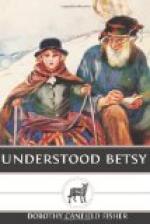Although this did not seem at all a sensible remark to Elizabeth Ann, who thought soberly to herself that she didn’t see why snoring made a dog as good as a man, still she was acute enough (for she was really quite an intelligent little girl) to feel that it belonged in the same class of remarks as one or two others she had noted as “queer” in the talk at Putney Farm last night. This variety of talk was entirely new to her, nobody in Aunt Harriet’s conscientious household ever making anything but plain statements of fact. It was one of the “queer Putney ways” which Aunt Harriet had forgotten to mention. It is possible that Aunt Harriet had never noticed it.
When Elizabeth Ann finished her breakfast, Cousin Ann made three suggestions, using exactly the same accent for them all. She said: “Wouldn’t you better wash your dishes up now before they get sticky? And don’t you want one of those red apples from the dish on the side table? And then maybe you’d like to look around the house so’s to know where you are.” Elizabeth Ann had never washed a dish in all her life, and she had always thought that nobody but poor, ignorant people, who couldn’t afford to hire girls, did such things. And yet (it was odd) she did not feel like saying this to Cousin Ann, who stood there so straight in her gingham dress and apron, with her clear, bright eyes and red cheeks. Besides this feeling, Elizabeth Ann was overcome with embarrassment at the idea of undertaking a new task in that casual way. How in the world did you wash dishes? She stood rooted to the spot, irresolute, horribly shy, and looking, though she did not know it, very clouded and sullen. Cousin Ann said briskly, holding an iron up to her cheek to see if it was hot enough: “Just take them over to the sink there and hold them under the hot-water faucet. They’ll be clean in no time. The dish-towels are those hanging on the rack over the stove.”
Elizabeth Ann moved promptly over to the sink, as though Cousin Ann’s words had shoved her there, and before she knew it, her saucer, cup, and spoon were clean and she was wiping them on a dry checked towel. “The spoon goes in the side-table drawer with the other silver, and the saucer and cup in those shelves there behind the glass doors where the china belongs,” continued Cousin Ann, thumping hard with her iron on a napkin and not looking up at all, “and don’t forget your apple as you go out. Those Northern Spies are just getting to be good about now. When they first come off the tree in October you could shoot them through an oak plank.”
Now Elizabeth Ann knew that this was a foolish thing to say, since of course an apple never could go through a board; but something that had always been sound asleep in her brain woke up a little, little bit and opened one eye. For it occurred dimly to Elizabeth Ann that this was a rather funny way of saying that Northern Spies were very hard when you first pick them in the autumn. She had to figure it out for




